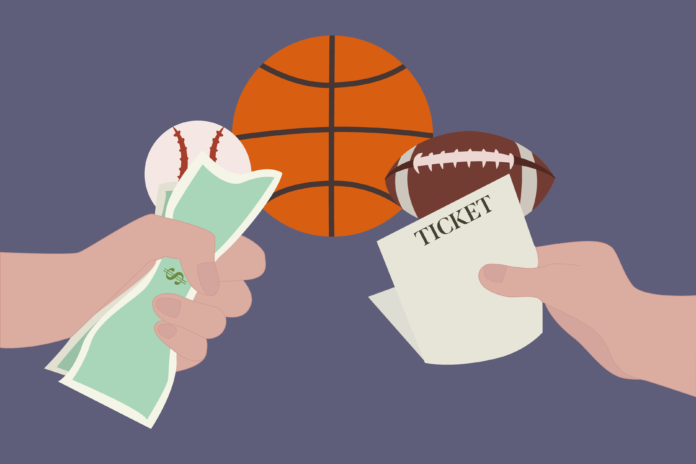How gambling entered into sports, and today sports gambling is easier to access, but can quickly become an addiction
By KATHERIN RAYGOZA –– sports@theaggie.org
The United States has a very long history of betting and gambling in sports. There are numerous types of bets that people participate in for enjoyment and there are other types of gamblings that are restricted or have become illegal.
Sports gambling was influenced by early American settlers when they began selling lottery tickets in the 17th and 18th century before income taxes existed. It was a colonist’s “duty” to buy lottery tickets to fund libraries, churches, colleges and even the Revolutionary War.
Then in the 19th century, as lotteries and casinos popularity grew in the U.S., gambling entered sports through horse races. Horse racing is an ancient sport that began in 4500 B.C., and was one of the most common sports in the world even during the 1800s. People found it less difficult to arrange bets, although they weren’t as organized as they are today.
“Lotteries were not the only form of gambling during [the 17th century],” Roger Dunstan said in a report on gambling for the California Research Bureau. “Wagering on horse racing was a popular form of gambling. Not surprisingly, it was not quite as organized nor as elaborate as modern horse racing. Rather, the gambling was limited to a few friendly bets between owners of horses and their partisans. The first racetrack in North America was built on Long Island in 1665.”
Once the American Stud book was published in 1868, horse racing developed into an organized enterprise. Then in the early 1900’s, bookmaking was outlawed which nearly ended the entire sport of horse racing. A bookmaker is someone that “takes money whenever they lay a bet to a customer, and they pay money out every time one of their customers wins a bet,” according to gamblingsites.org.
“You start out with a general premise that in most states, gambling of any type was, by legislative pronouncement, deemed to be illegal,” Dan Etna, co-chair of the Sports Law Group at Herrick Feinstein LLP, told SB Nation. “Some of this stuff was rather deeply embedded in the states’ DNA, if you will. It wasn’t just the law. Like for instance, at one point in time, New York State, its constitution outlawed gambling of any type.”
Due to these historical events, sports gambling in modern day has been transformed into an entire new era for younger generations since betting is more accessible through the internet. Saul Malek, 23, for example, played multiple sports as he was growing up, and during his teen years he joined a fantasy baseball league which he describes as a “game where people manage rosters of real players and compete against each other using players’ real-life game statistics; the players are scored by category; and the person with the highest cumulative point totals at the end of the season wins.”
Later on in college, Malek took his first bet for $10 betting that the Kansas City Royals would beat the Toronto Blue Jays. Malek won that bet and he said it made him feel like a big shot. This was the beginning of his horrific betting addiction.
Soon enough Malek discovered that he needed “nonstop action.” Nonstop action means that your sportsbook or bookie (a company or individual who accepts bets from individual sports bettors) has canceled all wagers on a particular line and no bets will proceed, whether they are winners or losers.
“He would find an online sports book and maybe win enough to pay a former bookie back,” Marie Fazio, a writer from The New York Times, writes. “More than often, though, he’d lose. Then he would block the bookie’s number, find a new sports book and repeat.”
Melek would make many bets, typically lose, and wouldn’t be able to pay the bookie’s back. His parents had to give him hundreds of dollars to bail him out of any trouble.
“He never considered that sports betting could escalate to an addiction that would lead him to lie, cheat and manipulate people for money. And yet… technological advances have made it easier than ever to wager money on sports,” Fazio said.
Similar cases like Malek’s are strictly emphasized by analysts and bookies so that the risks of addiction decline, especially for young adults since they are the most vulnerable. According to americangaming.org, Americans wagered over $13 billion in legal sports betting in 2019, making the Super Bowl one of the sporting events to have the most bets placed on. Also in 2019, The Gaming Association was expecting over 47 million Americans to place bets during the NCAA March Madness basketball tournament.
Considering how many people in the U.S. make bets, only 1% of adults have a gambling disorder. The core symptom is to continue gambling despite knowing the harmful consequences. With gambling being easily accessible with sites like FanDuel, DraftKings among others where one could place bets from an app, sports gambling is a high risk, and that is why laws have been put into place.
“We’re now in a phase where the nation has an appetite for sports betting,” Dr. Timothy Fong, a professor of psychiatry with a specialty in addiction at the University of California, Los Angeles, said. “It created this new form of entertainment that society has approved, but that form of entertainment does have a potential for addiction.”
Written by: Katherin Raygoza –– sports@theaggie.org




